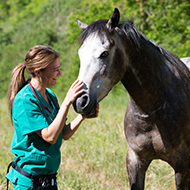
Equine vets looking to make a difference in the profession urged to apply.
The British Equine Veterinary Association (BEVA) is inviting nominations from Ordinary and Concessionary BEVA members for this year's council elections.
BEVA Council members guide the direction and strategy of the Association and represent the industry on a wider scale, helping to improve the working lives of equine veterinary professionals.
They are assigned to one or more portfolios and may also be asked to serve on sub-committees alongside representing BEVA on outside bodies within their areas of expertise.
Urging potential Council members to stand, BEVA Trustee Fran James said: “You will have the opportunity to influence, change, and advance the equine veterinary profession. It is also a fantastic opportunity to meet and work with a diverse group of people who are passionate about equine veterinary medicine.”
There are between four and five vacancies on BEVA Council this year and one on BEVA’s Board of Management. In order to stand, candidates must complete a nomination form and a short personal statement. They must also be nominated by two BEVA members.
BEVA junior vice president Dave Rendle added: “I would urge anyone that is serious about trying to make change in the equine veterinary profession or the future of the profession to consider getting involved.”
Nominations for BEVA Council close at 12pm on Wednesday 14 July 2021. The election period will then begin on 3 August 2021, closing on 31 August 2021, when eligible BEVA members will be invited to vote on the BEVA website.
To submit your nomination, please click here.
BEVA encourages prospective candidates to contact Fiona Cunnington for an informal discussion about being on the BEVA Council at fiona@beva.org.uk



 The latest
The latest